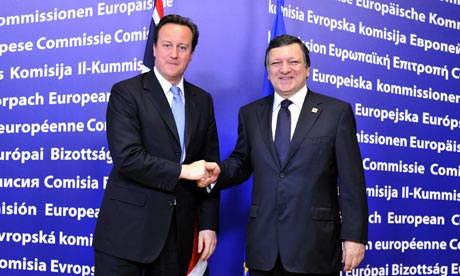European commission president backs David Cameron's plans to tackle UK deficit

David Cameron today received powerful backing from the European commission for his plans to tackle Britain's £156bn fiscal deficit during his first visit to Brussels as prime minister.
In a blow to Labour, which is accusing the coalition of moving too quickly to tackle the deficit, the European commission president, José Manuel Barroso, described Britain's plans as "exactly the right medicine".
Speaking in Brussels this morning after breakfast with Cameron at the commission's Berlaymont headquarters, Barroso said: "I want to pay tribute to the efforts the UK government coalition is taking. We believe they are exactly taking the right medicine for the situation."
The president's remarks were immediately welcomed by Cameron, who is under fire from the Labour party for tackling the deficit too soon and too quickly. Labour says that the £6bn of spending cuts this year – and further cuts from next year – could jeopardise the fragile economic recovery and undermine vital public services.
But Barroso reflected the thinking across the EU that dramatic action now needs to be taken to tackle deficits in the wake of the sovereign debt crisis in Greece.
The president, who made an effort to woo Cameron by serving him a cooked English breakfast of bacon, sausage and egg, warned that deficit reductions had to be calibrated with care.
"We must avoid a decade of debt, we must build a generation of growth," Barroso said. "At the same time budget cuts must not mean that growth is stifled. Growth is the key."
Cameron warmly welcomed Barroso's remarks. "I very much admire his approach as president of the commission," the prime minister said.
"What he just said about the importance of getting our public finances in order – that there can be no growth without confidence and that getting our public finances in order is the key to confidence – is absolutely right."
The remarks by Barroso, who enjoyed strong relations with Gordon Brown and Tony Blair, will help the government as it prepares for the post-election emergency budget on Tuesday.
George Osborne, who will set out overall spending plans for next year, believes he now has the space for a stringent spending round in the autumn spending review after the new Office for Budget Responsibility downgraded Britain's growth forecasts earlier this week.
The Treasury, traditionally the most Eurosceptic department in Whitehall, will be delighted by Barroso's remarks, which follow a recent declaration by G8 finance ministers about the importance of fiscal consolidation. Osborne believes that the G8 has embarked on a major change since the G20 London summit of last year, where leaders stressed the importance of fiscal stimuli.
The prime minister walked this morning from the Berlaymont with Barroso across the busy Rue de la Loi in the heart of the European Quarter in Brussels to attend his first European summit as prime minister.
Britain feared that the summit could have been a difficult for Cameron because the EU's 27 leaders will consider a commission proposal for them to submit their national budgets to the commission for approval.
Commission officials have sought to reassure Britain by saying they simply want to examine the "forecasts and assumptions" underpinning budget decisions. Britain has been told that the proposal is aimed at countries like France and Greece which have a reputation for manipulating such data.
"Britain has an excellent and credible system," one Brussels source said. "This is about monitoring countries like Greece and France which have a habit of manipulating their data."
Britain aims to meet the commission demands, which are subject to secondary EU legislation, by sending over details of the pre-budget report, which is unveiled in the autumn. It could also send assumptions from the new OBR, which will publish its growth forecasts on the eve of every spring budget.
Cameron made clear he was looking forward to a constructive relationship with the EU when he welcomed a declaration by Barroso that the EU should be focused on economic growth rather than building up EU institutions.
The prime minister said: "I very much agree with what you have just said: that we should be focusing on the issue of substance and not on institutional reform. That was music to my ears. You will see Britain playing a very positive, a very engaged, a very active role in the EU and at this European council."

No comments:
Post a Comment